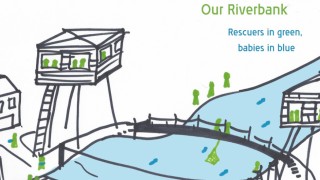You are here: Emma Peak Blog: Exploring the Riverbank
"Exploring the riverbank"
25 March 2019
"In my last job with a large international relief and development agency, we would often talk about how, as an organisation, we didn’t just want to be a small sticking plaster on a large wound and the need to focus on the root causes of poverty to bring about lasting change.
At an event someone once shared a story that gives an example of this perspective. It’s called: ‘children in the river’, and goes something like this:
‘One day in a small village, a villager noticed a child floating down the river. The villager quickly swam out to save the child from drowning. The next day this same villager noticed two children in the river. He called for help, and both children were rescued from the waters. The following day, four children were seen caught in the turbulent current. And then eight, then more, and still more!
The villagers organised themselves quickly, setting up watchtowers and training teams of swimmers who could rescue children. Rescue squads were soon working 24 hours a day and each day the number of helpless children floating down the river increased. The villagers felt they were doing well to save as many as they could each day. And life in the village continued on that basis.
One day, however, someone raised the question, "Where are all these children coming from? Let’s organise a team to head upstream to find out who’s throwing all these children into the river in the first place!’
This is the point where people tend to stop telling the story as they’ve illustrated their principal. However, lately I’ve been discovering what it’s like to be in that team headed upstream: following a leader into the unknown to find out what’s happening upstream, why it’s happening, getting alongside those doing the throwing, and trying to understand their behaviour and actions. Then working in partnership, to make sure everyone is focused what’s best for the child – so that no child ends up in the river.
Over the last seven months, people have commented what a privilege it must be to have the space to do this work, to be able to step away from the day to day rescue mission, look at the bigger picture and influence and nudge the situation. And it is, and it’s needed. But being the person living and occupying that space I have also found it is challenging and uncomfortable. It takes time and patience, at times it feels like you’re not making any progress, feel helpless, or have made it worse.
A fellow traveller up the river said to me last week, after I felt like jumping in the river too, “Please go easy and know that the hardest part in any learning process is when we don't know what we don't know yet! The second hardest is that we know we don't know it, and it’s too easy to turn away at that stage. But we can’t, because we are the Children's Community and we are the trailblazers: we have to take the risks that no one else is yet willing to do.”
When you’re off being the pioneer, building relationships with those up the river, I think those down river dealing with the day to day rescues must think: ‘what are they even doing up there?’ Recently I’ve had many conversations about how long it takes to understand a complex problem before getting to the stage of making positive changes. Yet those down river see the demand and are clinging on and waiting for something to change up river to lighten the load. They want to see the results of you being resourced to go up river. And that’s pressure!
You only do a job like this because you want to make a difference and, all the time, you’re living knowing there are children floating in the river who need help. The temptation is to want to be the sticking plaster!
At times I have found myself envious of those on the frontline, those who (I perceive) can finish the day being able to say: ‘I saved seven children today’. (Although the reality is that they’re most likely giving themselves a hard time that they should be doing more). Working with practitioners, I see the amazing things they’re doing for children and young people, and the difference they’re making, and I ask myself: “But what are you doing Emma?”
I think many people can see the need to go up the river, but few go. But without some going upstream, how can we change the system? How can we change things so that children don’t find themselves adrift and village life does not have to be a cycle of rescue missions? How can we tackle the root causes? I intend to continue to try and find out."
Blogger: Emma Peak

